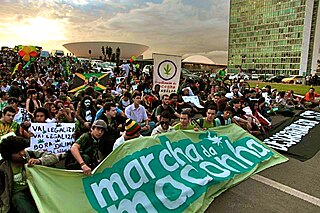Abortion in Brazil is a crime, with penalties of one to three years of imprisonment for the recipient of the abortion, and one to four years of imprisonment for the doctor or any other person who performs the abortion on someone else. In three specific situations in Brazil, induced abortion is not punishable by law: in cases of risk to the pregnant person's life; when the pregnancy is the result of rape; and if the fetus is anencephalic. In these cases, the Brazilian government provides the abortion procedure free of charge through the Sistema Único de Saúde. This does not mean that the law regards abortion in these cases as a right, but only that women who receive abortions under these circumstances, and the doctors, will not be punished. The punishment for a woman who performs an abortion on herself or consents to an abortion performed by another outside these legal exceptions is one to three years of detention. The base penalty for a third party that performs an illegal abortion with the consent of the patient, ranges from one to four years of detention, with the possibility of increase by a third if the woman comes to any physical harm, and can be doubled if she dies. Criminal penalties fixed at four years or less can be converted to non-incarceration punishments, such as community service and compulsory donation to charity.

The Global Marijuana March (GMM), also referred to as the Million Marijuana March (MMM), is an annual rally held at different locations around the world on the first Saturday in May. A notable event in cannabis culture, it is associated with cannabis-themed events, which may include marches, meetings, rallies, raves, concerts, festivals, and attempts at educational outreach.

In the United States, the non-medical use of cannabis is legalized in 24 states and decriminalized in 7 states, as of November 2023. Decriminalization refers to a policy of reduced penalties for cannabis offenses, typically involving a civil penalty for possessing small amounts, instead of criminal prosecution or the threat of arrest. In jurisdictions without penalty the policy is referred to as legalization, although the term decriminalization is sometimes used for this purpose as well.

In the United States, increased restrictions and labeling of cannabis as a poison began in many states from 1906 onward, and outright prohibitions began in the 1920s. By the mid-1930s cannabis was regulated as a drug in every state, including 35 states that adopted the Uniform State Narcotic Drug Act. The first national regulation was the Marihuana Tax Act of 1937.

Nelson Azevedo Jobim is a Brazilian jurist, politician and businessman. He held the positions as congressman, Minister of Justice, Minister of Defense, Minister of the Supreme Federal Court (STF), where he was also president between 2004 and 2006. He is currently a member of the Board of Directors and responsible for Institutional Relations and Compliance Policies at BTG Pactual Bank.

Drug liberalization is a drug policy process of decriminalizing, legalizing, or repealing laws that prohibit the production, possession, sale, or use of prohibited drugs. Variations of drug liberalization include drug legalization, drug relegalization, and drug decriminalization. Proponents of drug liberalization may favor a regulatory regime for the production, marketing, and distribution of some or all currently illegal drugs in a manner analogous to that for alcohol, caffeine and tobacco.
In the early 21st century, advocacy for drug legalization has increased in Latin America. Spearheading the movement, the Uruguayan government announced in 2012 plans to legalize state-controlled sales of marijuana in order to fight drug-related crimes.

The legal history of cannabis in the United States began with state-level prohibition in the early 20th century, with the first major federal limitations occurring in 1937. Starting with Oregon in 1973, individual states began to liberalize cannabis laws through decriminalization. In 1996, California became the first state to legalize medical cannabis, sparking a trend that spread to a majority of states by 2016. In 2012, Washington and Colorado became the first states to legalize cannabis for recreational use.

Luís Roberto Barroso is a Brazilian law professor, jurist, Justice and President of the Supreme Federal Court of Brazil, having been nominated to the position by President Dilma Rousseff in 2013. Between 2020 and 2022, Barroso also served as President of the Superior Electoral Court.

Florida Amendment 2, Use of Marijuana for Certain Medical Conditions, is an initiative that appeared on the November 4, 2014, ballot in the state of Florida as a citizen initiated state constitutional amendment.

Cannabis in South Dakota is legal for medical use as of July 1, 2021, having been legalized by a ballot initiative on November 3, 2020. Prior to then, cannabis was fully illegal, with South Dakota being the only U.S. state which outlawed ingestion of controlled substances. Testing positive for cannabis can be a misdemeanor offense. South Dakota would have become the first state in US history to legalize recreational and medical cannabis simultaneously, but an amendment legalizing recreational marijuana that was approved in the same election was struck down as unconstitutional the following February. The challenge claimed the amendment violated Amendment Z, the "Single-Subject Rule". The decision was appealed to the South Dakota Supreme Court, which upheld the lower court's decision on November 24, 2021.

Cannabis in Nebraska is fully illegal, but first offense for possession of small amounts was reduced to a civil infraction in 1979.

Cannabis in New Mexico is legal for recreational use as of June 29, 2021. A bill to legalize recreational use – House Bill 2, the Cannabis Regulation Act – was signed by Governor Michelle Lujan Grisham on April 12, 2021. The first licensed sales of recreational cannabis began on April 1, 2022.

Cannabis in Florida is illegal for recreational use. Possession of up to 20 grams is a misdemeanor offense, punishable by up to a year in jail, a fine of up to $1000, and the suspension of one's driver's license. Several cities and counties have enacted reforms to apply lesser penalties, however.

Cannabis in Brazil is illegal but decriminalized, while possession and cultivation of personal amounts and for private use were de-penalized in 2006. In 2024, Brazil's Supreme Court ruled that Brazilians can possess and transport up to 40 grams of cannabis for their own consumption. however, the sale continues to be considered a crime. Use of cannabis medications is allowed for terminally ill patients or those who have exhausted other treatment options. It is also possible to import, manufacture and sell cannabis-based medicines.

Cannabis in Mexico is legal for both recreational and medicinal purposes. It became legal for recreational purposes in June 2021, upon application and issuance of a permit from the health secretariat, COFEPRIS. On 29 June 2021, the Supreme Court of Mexico decriminalized the recreational use of cannabis. President Andrés Manuel López Obrador signed a bill that allows adults 18 and over to possess up to 28 grams of cannabis and grow up to six marijuana plants on their property.
The list includes and details significant events that occurred in the global history of national-level implementations of, or changes made to, laws surrounding the use, sale, or production of the psychoactive drug cannabis.
Cannabis in Georgia is legal in terms of its possession and consumption due to a ruling by the Constitutional Court of Georgia on 30 July 2018. This makes Georgia one of the first countries in the world to legalize cannabis for both recreational and medical use, and the only former-communist state in the world to do so.
U.S. President Joe Biden stated in February 2021 that his administration will pursue cannabis decriminalization as well as seek expungements for people with prior cannabis convictions. As of October 2022, Biden pardoned thousands of people convicted of marijuana possession under federal law. However, according to the Marshall Project, nobody was released from prison as a result of the October 2022 pardons, as no federal inmates were incarcerated for simple marijuana use at the time.

RE 635.659 was a case of the Supreme Court of Brazil concerning the decriminalization of drugs for personal use. The case's rapporteur, Gilmar Mendes, cast the initial vote in favor of decriminalization, and the majority of the Court agreed to decriminalize cannabis.











